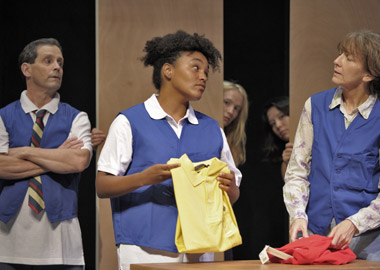In his 1933 memoir Down and Out in Paris and London, middle-class, Eton-educated George Orwell related his experiences living hand to mouth at the bottom of the social and economic heap. Nickel and Dimed, Barbara Ehrenreich’s 2001 account of living among America’s working poor, could well be titled Down and Out in Florida, Maine and Minnesota.
Her book, subtitled On (Not) Getting By in America, and Joan Holden’s slightly fictionalized stage version are first-person accounts of a well-to-do journalist’s sojourn in the underbelly of the American dream, where people—mostly women and other “minorities”—work in the low-wage jobs that make our nation’s service industries thrive.
The play, now on at Smith College, skims the surface of Ehrenreich’s searing indictment of the system in which millions of people scratch and scramble to not quite make ends meet, sometimes working two or even three jobs at once. In a series of snapshot episodes, it covers all four of the jobs she took in three different cities—at a chain restaurant, a housecleaning service and a nursing home (concurrently) and a certain big-box retailer, here called Mall-Mart.
Sam Rush’s smooth, inventive staging is the first co-production between his New Century Theatre and Smith’s theater department, where he also works as production coordinator (another example of two-job syndrome?). The cast, headed by NCT veteran Sara Whitcomb, who’s progressively wry, harried and outraged as “Barbara,” also includes guest artist James Emery and nine Smith students who step in and out of multiple roles and service uniforms.
The pro-am mix is surprisingly successful, with Whitcomb and Emery supported effectively and often humorously by the students, particularly Rachel Garbus, Trenda Loftin, Kathy Lebron and Jaz Tupelo. Jane Hamel provides folk-flavored incidental music, including “This Land is Your Land,” with the clear implication that “this land is (not always) made for you and me.”
Nickel and Dimed runs through Saturday, Oct. 29, Smith College, 585-ARTS (2787), smith.edu/smitharts.
*
The Heiress
The play 2 Washington Square could well be titled Washington Square II. Henry James’ novella Washington Square, which was set in 1840s New York, has been updated in Constance Congden’s new adaptation to the early 1960s. The central conflict, involving a stern father’s opposition to his plain, shy daughter’s opportunistic suitor, is now a mother-daughter confrontation over issues of class and race.
In Congden’s version, Dr. Eleanor Sloper, a distinguished gynecologist, despairs of her daughter Catherine’s indifference to social standing and the wealth she stands to inherit. And when the charming but penniless Morris Townsend—who also happens to be “colored”— captivates the girl with romance and roses, Dr. Sloper threatens disinheritance, not only because she suspects he’s a fortune hunter but because such a match would be socially disgraceful. This despite the fact that Cathy, too, is “exotic,” as her mother puts it, with her dead father’s dark Mediterranean complexion.
The play is set against the background of JFK’s election and assassination, and ends as an anti-Vietnam War demonstration gets underway in Washington Square Park, just outside the Slopers’ genteel townhouse. Like James’ original, Congden’s plot avoids a conventional happily-ever-after ending and follows the young woman’s journey from filial duty to independent spirit, while placing that transformation at a national tipping point as well.
2 Washington Square is at Amherst College’s Kirby Theater through Saturday, Oct. 29; free, no reservations necessary, (413) 542-2277, amherst.edu/go/performance for info.



